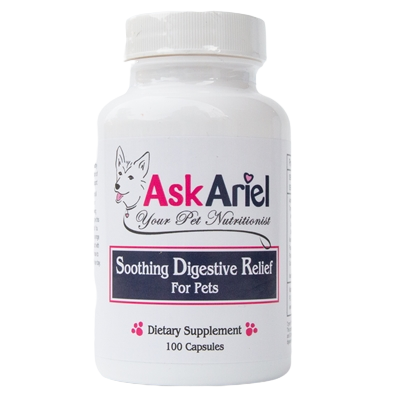
Why Is My Dog Throwing Up?
Natural Remedies For Dog Vomiting
Dogs may throw up for various reasons. Whether it's simple vomiting, yellow bile, or a mix of vomiting and diarrhea, it can be uncomfortable for your pet. A range of different causes from dietary indiscretions to gastrointestinal issues, can contribute to dog vomiting and diarrhea. Understanding the reasons why a dog is vomiting can help them get much-needed relief. Here are some tips about how you can treat dog throwing up naturally using our home remedies along with your veterinarian's treatment plan.
4 Tips To Help A Dog Throwing Up
1. Check With Your Vet - Contact your vet as your dog's symptoms may require treatment. Persistent or severe vomiting warrants veterinary attention.
2. Access To Clean Water - Ensure your dog has easy access to clean water to prevent dehydration.
3. Bland Diet With Small Frequent Meals - Feed small, frequent meals with a bland diet.
4. Add Digestive Supplements - Introduce dog-friendly probiotics and digestive supplements to promote a healthy balance of gut bacteria.
Supplements For A Dog Throwing Up

Power Probiotic for Dogs
Promotes a balanced gut microbiome to aid in the digestive process which may help relieve dog vomiting and diarrhea. When a dog is throwing up, it can disrupt the natural balance of the digestive system. Probiotics help restore and maintain this balance, supporting proper digestion.
Learn more about Power Probiotic

Soothing Digestive Relief
Our natural stomach soothing supplement for dogs. Includes enzymes to promote efficient digestion, reducing the risk of your dog puking. Helps to calm and soothe inflammation in the digestive tract, providing relief for dogs experiencing throwing up and diarrhea.
Learn more about Soothing Digestive Relief
Diet Tips For A Dog Throwing Up
Diet changes can play a crucial role in managing vomiting in dogs. Here are some dietary adjustments that may help:
- Hydration - Ensure your dog stays hydrated, especially if vomiting has led to dehydration. Offer small amounts of water frequently or consider providing ice chips.
- Bland Diet - Transitioning your dog to a bland diet can be beneficial during the recovery period. This often consists of easily digestible foods. A lower-fat diet is often recommended, especially if the vomiting is related to dietary indiscretions or pancreatitis. Choose lean protein sources.
- Feed Frequent, Smaller Meals - Instead of feeding large meals, offer smaller, more frequent meals throughout the day. This can help reduce the strain on the digestive system and prevent overloading the stomach.
- Avoid Certain Ingredients - Identify and eliminate potential triggers in your dog's diet. Common allergens include dairy products, grains, and certain proteins. An elimination diet can help pinpoint problematic ingredients.
- Special Diets - In some cases, like when dog vomiting is due to kidney disease or liver disease, your veterinarian may recommend a special diet that is lower in fat and protein. These diets are designed to meet specific dietary needs of certain health conditions.
- Gradual Transition Back To Regular Diet - Once the dog vomiting and diarrhea subsides, it is best to gradually reintroduce your dog's regular diet. Monitor for any signs of recurrence, and if needed, consult with your veterinarian for further dietary recommendations.
Common Reasons For A Dog Throwing Up
Dogs may throw up for a variety of reasons. Some are nothing to worry about and others can warrant a trip to the vet. A dog throwing up yellow bile, undigested food or a full meal can be caused by a dietary indiscretion or a more serious health condition. Below are some of the most common reasons that a dog vomits:
- Gastrointestinal Condition - Dogs with Inflammatory Bowel Disease (IBD/IBS), ulcers, constipation, colitis, parasites or acid reflux may vomit from an imbalance and inflammation in their digestive tract.
- Bilious Vomiting Syndrome - Bile is produced by the liver to help with the digestion of fats and protein. It can be irritating to the stomach and can appear as a yellowish foamy substance. When bile leaks into other parts of the digestive system (stomach and small intestine), it can cause vomiting. It usually occurs if your dog has ingested fatty foods or has not eaten frequently enough.
- Food Allergies - There are many common ingredients in commercial dog foods that can cause acid reflux or digestive upset. Dogs can be allergic to proteins, such as poultry or beef, and grains like corn, wheat gluten and rice. An intolerance or sensitivity to these ingredients can also cause vomiting.
- Diet Changes - When making diet changes, it is important to make changes slowly. Some dogs can get an upset tummy, vomiting or diarrhea if changes are made too quickly.
- Bloat - Bloat occurs when the stomach fills with gas and fluid. It is very uncomfortable and can cause the stomach to twist and cut off its blood supply. If your dog has a distended abdomen, shortness of breath, weakness, pale gums and is vomiting bile or retching, it is important to see a veterinarian as bloat is a serious condition.
- Pancreatitis - Dogs with pancreatitis have very sensitive digestion and require a low fat diet. When dogs with pancreatitis eat high-fat foods, it can trigger a flare-up with symptoms including extreme stomach pain, vomiting and diarrhea.
- Liver Disease - The liver is responsible for bile production (to help with the digestion of fats and protein) and detoxification. If the liver is compromised, it may not be able to remove enough toxins from the body. Signs of liver disease can include a loss of appetite, diarrhea and vomiting.
- Kidney Disease - The kidneys filter out toxins in the blood. When kidney function is impaired, the toxins and metabolic waste build up. One of the hallmark symptoms of kidney disease is acid stomach and nausea.
- Ingestion of Toxic Substances - A dog will likely throw up as a natural reaction. If your dog may have eaten a poisonous plant or ingested a household chemical, it is important to contact your veterinarian or call the ASPCA Pet Poison Hotline at 888-426-4435.
- Intestinal Obstruction - Dietary indiscretion is more common in puppies and young dogs. The most common causes of intestinal blockages in dogs are toys, rocks, bones and socks. A dog will try to expel the object by vomiting. If it is too far down in the intestines, it can cause bowel obstruction and may require surgical removal. The primary symptoms of a blockage may include vomiting, loss of appetite, weakness, diarrhea, and weight loss.
If your dog throws up once and then eats and poops normally, it may just be an isolated incident. It is important to discuss any long-term or chronic vomiting with your vet, as it could be a sign of something more serious.
|